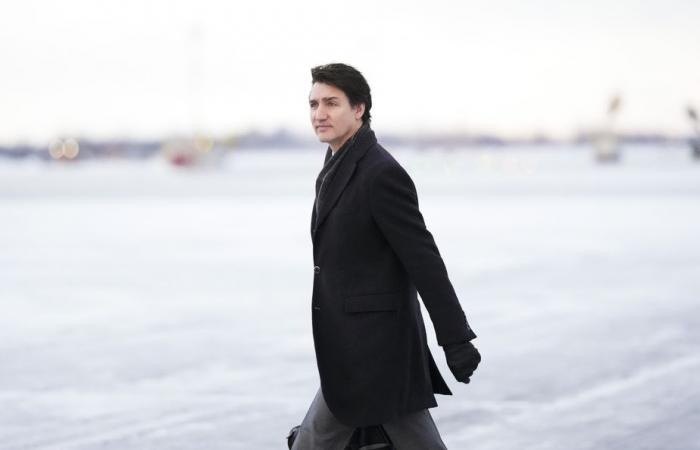(Ottawa) Prime Minister Justin Trudeau flies to Poland on Sunday to attend events marking the 80the anniversary of the liberation of the Auschwitz-Birkenau concentration camp.
Posted at 8:21 a.m.
David Baxter
The Canadian Press
He will visit the site of the Nazi regime’s largest camp, where more than a million people were murdered during the Holocaust.
On Monday, the world will mark eight decades since the liberation of Auschwitz, the Nazi extermination camps where more than a million people, most of them Jews, were murdered during World War II.
PHOTO ODED BALILTY, ASSOCIATED PRESS
People walk in front of the former German Nazi concentration and extermination camp Auschwitz-Birkenau in Oswiecim, Poland, on the eve of the 80th anniversary of its liberation on January 26, 2025.
As world leaders and Auschwitz survivors prepare to gather at the Auschwitz-Birkenau Memorial and Museum in southern Poland, a new poll suggests a growing number of Canadians believe history of the Holocaust has been exaggerated.
The survey conducted by the polling firm Léger last spring and commissioned by the Association for Canadian Studies revealed that 18% of Canadians, aged 18 to 24, agreed with the statement “I think that the “Holocaust was exaggerated.”
Among Canadians aged 25 to 34, 15% agreed with this statement.
The survey was conducted among 1,519 Canadians between May 17 and 20, 2024. A margin of error cannot be assigned to a panel survey.
Another Léger poll conducted in February 2024, which asked the same question, indicated that 16% of 18-24 year olds agreed with this statement, as did 8% of 25-34 year olds.
The number of Canadians aged 35 to 44 who agree with this statement increased from 5% to 8% between the February and May surveys, while the rate jumped from 4% to 11% among Canadians aged 45 to 54.
Deborah Lyons, Canada’s special envoy for preserving the memory of the Holocaust and combating anti-Semitism, said in an interview Friday that the world faces a challenge as the number of survivors of the Holocaust continues to decline.
“A story like the Holocaust is above all an emotional story. It is not only about the facts, but also about the loss of these survivors who are reaching the end of their lives. This is particularly difficult for us. So we need to work on new ways to help people understand the history of the Holocaust,” she explained.
A year ago, the Claims Conference released what it called an “unprecedented” demographic study of Holocaust survivors, reporting that 245,000 people had survived were still alive.
Nearly half of those who died lived in Israel, and more than one in six people lived in the United States. At that time, 5,800 survivors lived in Canada.
Most survivors are over 90 years old.
-The Auschwitz Museum said it expects around 50 survivors to attend the ceremony on Monday.
M’s last visitme Lyons at the Auschwitz National Museum took place in May 2024 as part of the March of the Living. This is an event focused on the study of the Shoah and the roots of intolerance and hatred.
“I know how disturbing it is to be on this ground where so many people have suffered so severely and so many have died,” she said.
“But it’s also an honor to be there to represent Canada and the Jewish community. »
Déborah Lyons will be present at the event in Poland on Monday alongside Prime Minister Justin Trudeau. She said Canadian Holocaust survivors will also be in attendance.
Léger and the Association for Canadian Studies also released a survey this month to determine where Canadians get information about the Holocaust.
The survey was conducted among 1,578 Canadians between January 17 and 19.
In this survey, 22% of Canadians under the age of 25 cited online sources as their primary source of information about the Holocaust, more than any other age group.
Films and documentaries were the most common primary source of information across all age groups, cited by 34% of all respondents.
Mme Lyons was encouraged that the survey indicated that 46 percent of all respondents said they were interested in learning more about the Holocaust, with interest higher among younger people.
“So we need to find ways to help people understand the history of the Holocaust, even if it’s not a lived experience,” she stressed.
Mme Lyons pointed to a $5 million fund over five years that the federal government launched in December to help promote Holocaust education.
“No matter how you do it, it’s about educating the public, whether through the more formal school system, through films, lectures, or through music or art. »
According to Mme Lyons, the human aspect is essential to educate younger generations about an act of genocide that killed more than 6 million Jews.
“What is so compelling and deeply disturbing about the Holocaust is that it took place over days, weeks, months and years of planning. Human beings who plan the deaths of others by setting up systems and infrastructure to treat people like we would cattle,” lamented Mr.me Lyons.
“It’s an incredibly compelling and heartbreaking story about how we lose our humanity. I think we owe it to our young people to find new and different ways to ensure that they hear about the Holocaust as a means of their own learning and their own personal enrichment. »







